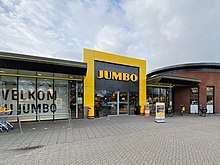Jumbo (supermarket)
Jumbo is a supermarket chain in the Netherlands and Belgium. It is part of the privately owned Van Eerd Group. Van Eerd was originally a grocery wholesale company, established in 1921.[1]
 | |
| Founded | 1979 |
|---|---|
| Headquarters | , |
Area served | Netherlands, Belgium |
| Products | Supermarkets |
| Owner | Van Eerd Group |
| Website | www.jumbo.com |

History
On 18 October 1979, Jan and Anita Meurs opened the first Jumbo supermarket in a former church building in Tilburg. It was named after the elephant Jumbo as an act of one-upping the name of a local rival store called Torro, which belonged to Van Eerd. In 1983, Van Eerd bought the Jumbo store from the Meurs family and subsequently expanded, first in the southern provinces, then nationwide.
As of May 2006, 77 establishments have been opened throughout the Netherlands. Together they have a market share of 3.4% in the Netherlands as of 1 January 2006. The head office and distribution centre are situated in Veghel. Jumbo has three regional distribution centres: Beilen, Drachten, and Den Bosch. With the opening of Jumbo in Valthermond, Drenthe in October 2005, there is a Jumbo in every province of the Netherlands. Until the acquisition of C1000, relatively few Jumbos were in the Randstad.
In September 2011, CVC announced that they would sell the C1000 supermarket chain. On 23 November 2011 it was announced that Jumbo would take over all C1000 stores. As a consequence Jumbo became the second largest supermarket chain in the Netherlands, after Albert Heijn. On 23 October 2014, the supermarket announced it would be a major sponsor of the UCI World Tour professional cycling team, Team LottoNL-Jumbo.[2]
On 26 January 2016, Jumbo announced that it had acquired V&D's restaurant chain, La Place, out of bankruptcy for an undisclosed amount of money.[3] In 2017-2019 it was a major sponsor of Racing Team Nederland that entered the European Le Mans Series in 2017 and the FIA World Endurance Championship in 2018-2019 and 2019–2020.[4]
References
- "Altijd lage prijzen op je dagelijkse boodschappen | Jumbo Supermarkten". www.jumbo.com (in Dutch). Retrieved 10 December 2019.
- "Gallery: Team LottoNL-Jumbo unveiled in Utrecht - Cyclingnews.com".
- "Jumbo buys La Place restaurants in V&D bankruptcy deal". NL Times. 26 January 2016.
- Goodwin, Graham (19 January 2018). "Van der Garde Joins Racing Team Nederland For 2018/ 2019 FIA WEC". dailysportscar.com. Retrieved 6 September 2019.